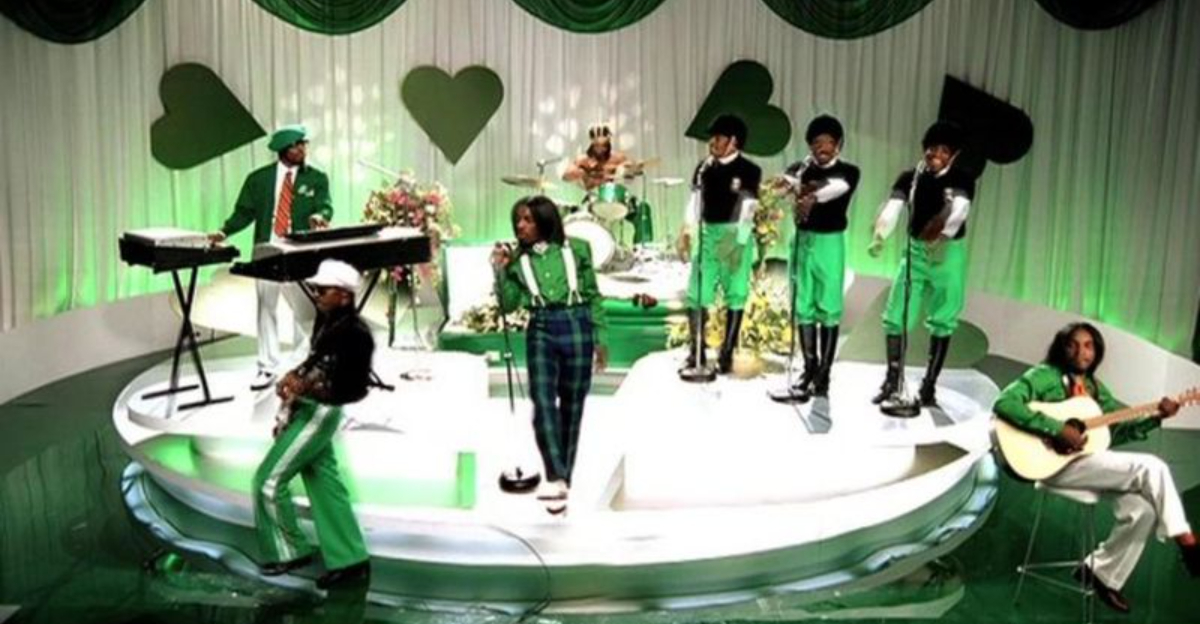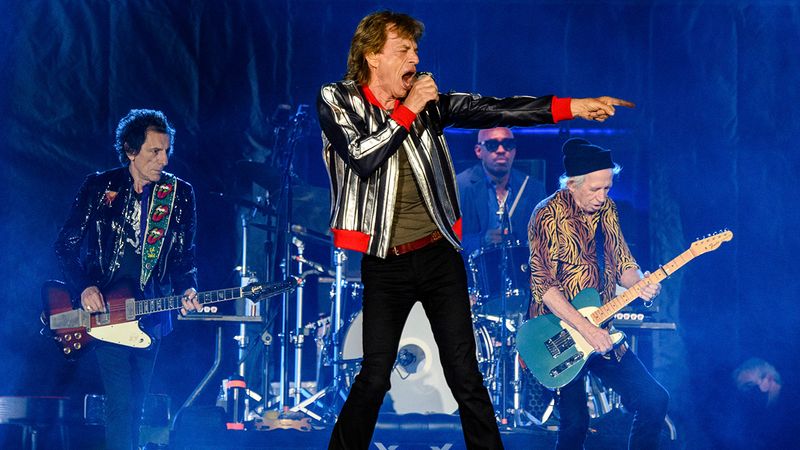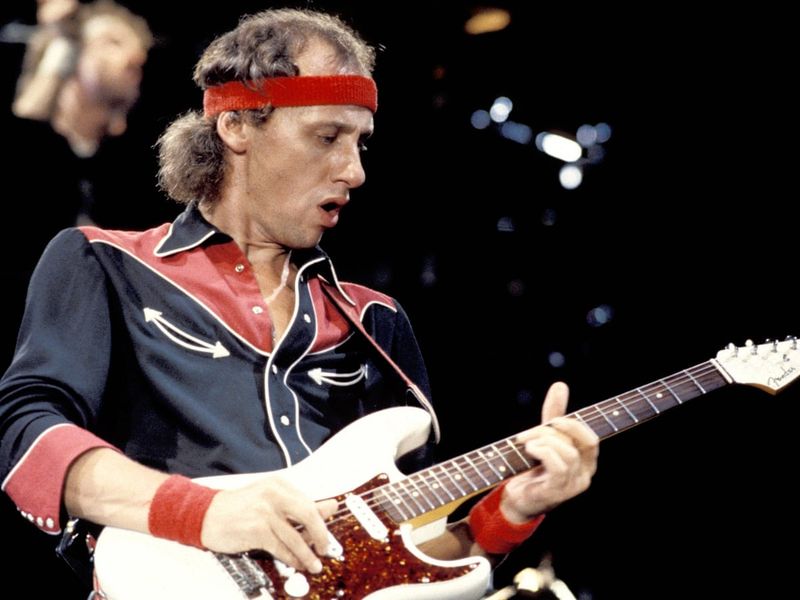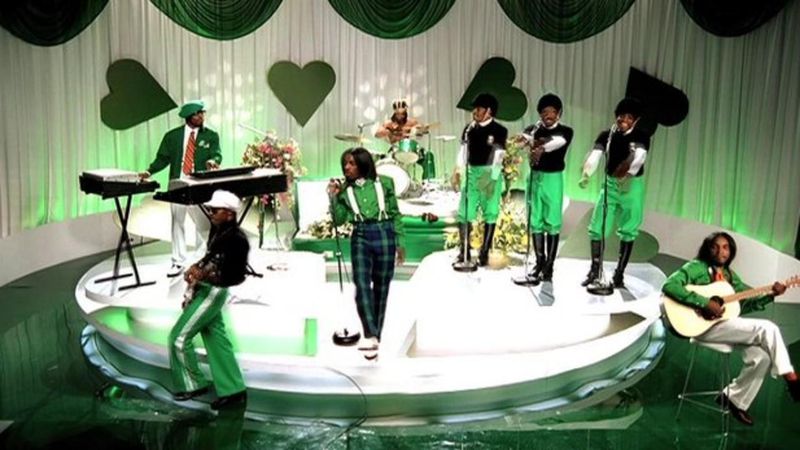Music has the power to inspire and unite, yet some beloved songs contain troubling themes. Here are 13 popular songs with racist undertones that might surprise you. This list delves into their histories and contexts.
1. “Brown Sugar” – The Rolling Stones (1971)
Mick Jagger’s iconic track “Brown Sugar” mesmerized audiences, yet its roots lie in a romanticized portrayal of slavery. The lyrics paint a vivid picture of a slave ship’s journey, entwining it with a catchy rock rhythm. The combination of rhythmic allure and unsettling imagery creates a dissonance that lingers. Jagger himself later admitted the song’s dubious nature, reflecting on its depiction of such a dark subject. This realization has led to ongoing discussions about the song’s place in modern music culture, questioning the balance between artistic freedom and social responsibility.
2. “The Charleston” – James P. Johnson (1923)
The energetic dance “The Charleston” became synonymous with the Roaring Twenties, yet its lyrics mock Black dialect. Emerging from minstrel shows, these lyrics reinforced harmful racial caricatures. The dance delighted audiences with its vibrant moves, contrasting its darker lyrical origins. Despite being associated with joy and liberation, the song’s history is intertwined with racial mockery. This juxtaposition highlights the complex narratives in music that can entertain while perpetuating stereotypes. Today, “The Charleston” serves as a reminder of the importance of examining cultural icons within historical contexts.
3. “Zip-a-Dee-Doo-Dah” – Song of the South (1946)
Disney’s “Zip-a-Dee-Doo-Dah” enchanted audiences with its cheerful melody, but the context of “Song of the South” is fraught with controversy. The film nostalgically presents plantation life, glossing over the harsh realities of slavery. Despite winning an Oscar, the song and its origins have been criticized for their portrayal of a “happy plantation.” Disney has since distanced itself from the film, excluding it from modern platforms like Disney+. This decision reflects a broader reckoning with the past and an acknowledgment of the impact of cultural representations.
4. “Run, Nigger, Run” – Traditional Folk Song
The haunting folk song “Run, Nigger, Run” served as a grim warning to enslaved people about slave patrollers. Its raw urgency and historical context highlight the terror and desperation faced by those seeking freedom. While later versions, like Johnny Cash’s “Run, Boy, Run,” sanitized its language, the song’s origins remain rooted in racial oppression. This transformation through covers highlights the evolution of cultural sensitivity yet reminds us of the chilling realities of its time. Understanding these songs offers a window into the complexities of musical heritage and its lasting implications.
5. “Squeeze Me” – Fats Waller (1925)
Fats Waller’s “Squeeze Me” is a jazz classic beloved for its melody, yet its origins lie in racial exploitation. Originally titled “The Boy in the Boat,” the song references the coded language of sex work in Black brothels. This playful tune, while musically rich, carried undertones of racial and social commentary. As songs like these transitioned into mainstream jazz, their sanitized versions masked deeper stories. Waller’s infectious rhythm and charm continue to captivate, but awareness of its background adds depth to its legacy.
6. “Basketball” – Kurtis Blow (1984)
Kurtis Blow’s “Basketball” is a hip-hop classic celebrating the sport’s culture, yet it contains a racial slur that reflects the era’s complex dynamics. Despite Blow’s own background, the line highlights hip-hop’s struggle between reclamation and reinforcement of racial terms. The song captures basketball’s vibrant essence, resonating with fans worldwide, but it’s also a reminder of language’s power in shaping perceptions. As hip-hop continues to evolve, “Basketball” stands as a testament to the conversations about identity and expression within the genre.
7. “Escape (The Piña Colada Song)” – Rupert Holmes (1979)
“Escape (The Piña Colada Song)” by Rupert Holmes became a catchy anthem, yet its original title contained a racial joke. Referencing Huey Lewis & the News, it mocked Huey P. Newton, a Black Panther leader. This casual jest laid bare the racial insensitivity prevalent in popular culture at the time. Despite its tropical allure and amusing narrative, the song’s background raises questions about the intersection of humor and racial awareness. Holmes later retitled it, reflecting a shift towards more conscientious artistry.
8. “The Christmas Song (Chestnuts Roasting…)” – Nat King Cole (1946)
“The Christmas Song,” performed by Nat King Cole, evokes warmth and holiday spirit, yet its earliest versions sparked debate. The original lyrics, containing lines perceived as minstrel imagery, underwent changes by Cole himself. This evolution reflects an artist’s awareness and sensitivity to cultural perceptions. The song’s transformation over time illustrates the shifting landscape of racial awareness in music. It remains a beloved holiday anthem, but understanding its lyrical journey enriches its place in history and the impact of subtle racial imagery.
9. “Mammy” – Al Jolson (1927)
Al Jolson’s “Mammy” epitomizes the minstrel tradition, romanticizing the “loyal mammy” stereotype popularized in blackface performances. Jolson’s rendition in “The Jazz Singer,” the first “talkie,” cemented this racial caricature in cinematic history. Despite his intentions to honor Black culture, the performance reinforced demeaning stereotypes. “Mammy” reflects an era where entertainment often exploited racial tropes, sparking dialogue on representation and respect. As discussions of racial sensitivity grow, revisiting songs like “Mammy” highlights the need for mindful engagement with cultural legacies.
10. “Short People” – Randy Newman (1977)
Randy Newman’s “Short People” courts controversy, employing satire to address prejudice. Critics argue it trivializes discrimination against marginalized groups, despite Newman’s intent to mock bigotry. The song’s playful tone contrasts with its biting commentary, creating a layered listening experience. While some appreciate its humor, others find its approach to sensitive topics problematic. Newman’s work consistently challenges societal norms, and “Short People” exemplifies the divisive nature of satire. Its legacy invites ongoing debates about artistic expression and the responsibilities of satire in music.
11. “Money for Nothing” – Dire Straits (1985)
Dire Straits’ “Money for Nothing” became a rock anthem but drew criticism for its use of a homophobic slur. Mark Knopfler claimed it was “in character,” yet the language sparked debate on artistic intent versus impact. Despite its catchy riff and commentary on rock star excess, the problematic language overshadowed its message. Over time, live performances and radio versions often omitted the slur, reflecting shifting societal norms. “Money for Nothing” serves as a case study in the balance between musical storytelling and evolving cultural awareness.
12. “My Sharona” – The Knack (1979)
“My Sharona” by The Knack captured the spirit of late 1970s rock, yet its lyrics sparked controversy over themes of statutory rape. Written by Doug Fieger about a 17-year-old, the song’s exuberant rhythm belied its unsettling subject matter. This juxtaposition of catchy tune and questionable content highlights music’s power to both entertain and unsettle. As listeners revisit “My Sharona,” questions about age, consent, and artistic responsibility emerge. The song remains emblematic of its era, prompting discussions on how cultural contexts shape our interpretation of art.
13. “Hey Ya!” – OutKast (2003)
OutKast’s “Hey Ya!” lured listeners with its infectious beat, while its lyrics explored the nuances of failed relationships. Some critics argue that the playful line “Shake it like a Polaroid picture!” exoticizes Black culture for mainstream consumption. This tension between musical appeal and cultural commentary illustrates the complexities of modern pop anthems. “Hey Ya!” remains a dance floor staple, yet its underlying themes provoke reflection on cultural appropriation. The song embodies the duality of entertainment and awareness, leaving a lasting impact on listeners and artists alike.













